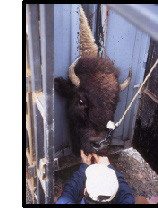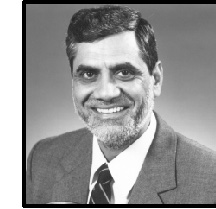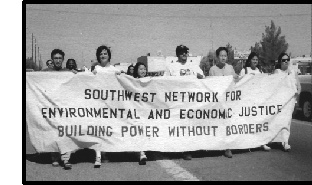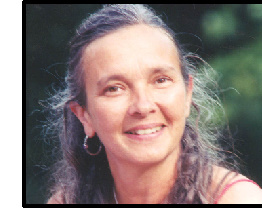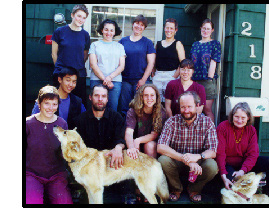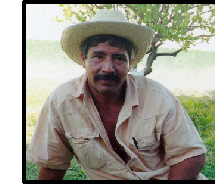

|

|

|

|
| |
|
|||||||||
|
Buffalo Field Campaign A century ago, the U.S. government nearly exterminated the American buffalo, an animal that once thundered across the Plains 60 million strong. By 1900, the herds of the Plains had completely disappeared. Yellowstone National Park sheltered the remaining 23 wild buffalo. Now the government is hunting buffalo again--this time spooked by a brucellosis, a
Every winter, Yellowstone's buffalo herd--which now numbers nearly 3,500--migrates down from the park to forage and escape heavy snowfall. When they cross the park border, officials from Montana Department of Livestock capture and kill the animals. In the winter of 1997, 1,100 Yellowstone buffalo were slaughtered. That year, the Buffalo Field Campaign formed to prevent another slaughter. Every winter, volunteers hunker down at the campaign's backcountry cabin and head out at dawn on daily ski patrols to track the buffalo. If necessary, volunteers are trained in direct action to stop the animals from being captured. During BFC's first winter patrol, only 11 buffalo were killed. This year, according to BFC volunteer Pete Leusch, 14 have been captured; five of them have been killed. BFC is supported by many local residents, who often join them for patrols and bring out hot drinks and food to the cabin. "The reckless and vindictive slaughter of the last wild American buffalo is a symptom of the disease that plagues our nation," Leusch says. "The Buffalo Field Campaign is taking a nonviolent stand against this injustice, and we are affecting change." For more information write: P.O. Box 957 West Yellowstone, MT 59758 or visit: www.wildrockies.org/buffalo
Ricardo Navarro El Salvador's 12-year civil war left its land and water in ruins. As the country struggles to repair its economy and progress to the level of its Central American neighbors, rapid development and population growth have cut down what trees were left in this once lush country, poisoned the groundwater and turned cities into heaps of trash. El Salvador is now the most deforested country in Latin America. Engineer Ricardo Navarro founded the Salvadoran Center for Appropriate Technology
CESTA is the largest nonprofit in El Salvador. "We have campaigns, workshops and projects on water protection, solar energy, sustainable management of solid wastes, climate change, protection of sea turtles, medicinal plant use and proper nutrition," Navarro says. "We also teach techniques to stop soil erosion and deforestation." In one of CESTA's most innovative programs, members teach young people to build and repair bicycles and wheelchairs for the poor. CESTA staff also design and make pedal-powered composting latrines, water pumps and corn grinders. Members ride bicycle carts around San Salvador collecting trash. Many graduates of the program have started their own small businesses around such bicycle technology. In the Guazapa region, which was razed by napalm bombs in the '80s, CESTA is creating a "Forest of Reconciliation" commemorating the 75,000 people who died during the war. So far, 65,000 fruit and medicinal trees have been planted. Navarro has received several death threats from the remnants of El Salvador's right-wing death squads for such activity. In 1995, Navarro won the prestigious Goldman Prize, a $125,000 cash award given to six outstanding environmentalists each year. As the new chairman of Friends of the Earth International, Navarro has been a vocal critic of globalization. He is advocating reparations for Latin American countries from the United States and other rich northern countries for using up the region's rich natural resources. "It's important to always consider social and environmental issues combined," Navarro says, "because in Third World countries, the exploitation of resources is often linked to issues of wealth and poverty, and violations of human rights." For more information write: Apartado 3065, 33 Calle Puniente
316 San Salvador,
Vera Mischenko Russia is hardly known for its stellar environmental record. From the moment Vladimir Putin took office, the Russian president has taken deep pleasure in gutting any environmental program he can lay his hands on. In May 2000, Putin dissolved the Russian equivalents of the Environmental Protection
That hasn't stopped Vera Mischenko, the country's most accomplished environmental lawyer. In 1991, as the country was emerging from the shambles of the Soviet Union, Mischenko founded Ecojuris, Russia's first public-interest environmental law firm. Since then, Mischenko has won numerous Supreme Court decisions bolstering Russia's environmental laws. Mischenko has steadfastly pursued the world's most rapacious polluters: multinational oil companies. In her most famous case, Mischenko sued the government when former Prime Minister Sergei Stepashin ignored the recommendations of the Committee on Environmental Protection and approved an Exxon proposal to drill for oil in the Russian Far East. The company planned to dump toxic waste from the oil extraction in the Sea of Okhotsk. In 1999, Mischenko won the case, making it the first time Russian environmental law was applied to a multinational corporation. Last year, she won the Goldman Prize. Ecojuris is now attempting to overturn Putin's decree abolishing the Forest Service and the Committee on Environmental Protection. Meanwhile, the government endlessly needles the group with charges of tax evasion. This warrants audits, which gives the government access to confidential information about Ecojuris' members--and serves as a reconnaissance mission for big polluters. For more information write: P.O. Box 172, Moscow 103009, Russia
M.C. Mehta In January, 30 million Hindus waded into the Ganges River to splash
in the waters of immortality. The occasion was Purna Kumbh Mela,
a six-week spiritual festival occurring only once every 12 years.
But these days, the ritual is a deadly toxic bath. The river now
harbors dysentery, hepatitis and cholera--as well as a litany of
chemicals--due to a steady stream of raw sewage and industrial pollution
flowing But thanks to the work of M.C. Mehta, India's top environmental lawyer, the Ganges
Mehta filed his first environmental lawsuit in 1984 after visiting the Taj Mahal. On his trip, Mehta had noticed the fine stonework was disintegrating due to acid rain and was driven to sue nearby polluting companies. After a decade of legal wrangling, in 1993 the Indian Supreme Court ordered 212 factories closed due to a lack of pollution controls; 300 more were ordered to upgrade their pollution-control systems. Mehta received the Goldman Prize that year for his work. More recently, Mehta has won a case making unleaded gasoline available in India and secured a ban on intensive shrimp farming. In December, he scored another victory when the Indian Supreme Court ordered 125,000 polluting factories in the New Delhi area closed due to pollution violations; the Indian capital is considered one of the world's five most-polluted cities. Currently his organization, the Indian Council for Enviro-legal Action, is focusing on a public awareness campaign concerning the mining and manufacture of asbestos in India. Mehta also wants India to establish a system of environmental courts. Mehta now has so many environmental cases in litigation that a courtroom has been set aside every Friday just for his own arguments. According to the Goldman Foundation, "Mehta has single-handedly obtained 40 landmark judgments and numerous orders from the Supreme Court against polluters, a record that may be unequaled by any other environmental lawyer in the world." For more information e-mail: mcmehta@unv.ernet.in.
Richard Moore The giant environmental groups could learn a few lessons from the Southwest Network for Environmental and Economic Justice. Operating out of a small office in Albuquerque with a staff of only seven people, SNEEJ has built a formidable network of more than 80 groups with an impressive record of dozens of victories. "From fighting nuclear storage to hazardous waste incinerators to Superfund sites in low-income communities," says Executive Director Richard Moore, "you name it, we've done it." For the past decade, SNEEJ has served as the central node of organizing activity for
Their bottom-up approach to organizing has worked. Member groups have been particularly successful at making the Environmental Protection Agency step up enforcement of federal regulations on polluting companies, educating migrant farmworkers about the dangers of pesticides, informing chemical-industry workers of their health risks, promoting greater workplace safety measures, monitoring workers rights at maquiladoras, and helping independent unions organize along the border. Moore has also served as an adviser to the EPA. SNEEJ is now targeting the poor environmental and labor records of high-tech companies such as Motorola and Intel, who have moved into Southwestern cities like Phoenix and Albuquerque via huge corporate-welfare deals. To make microchips, high-tech companies consume and contaminate massive quantities of water--a scarce resource in the Southwest. Meanwhile, promises of jobs for local residents have rung hollow. "Intel and other polluters used to view us as a little mosquito biting at their arms," Moore says. "Now they know that the mosquito has the bite of a tiger." For more information write: P.O. Box 7399 Albuquerque, NM 87105
Wangari Maathai Wangari Maathai is not only one of the world's most fearless greens, but also a proud feminist and undaunted opposition leader in her native Kenya. In 1977, she began planting trees with a women's group in an effort to promote sustainable development in rural areas. These small seedlings grew into Kenya's Green Belt Movement, which now manages
On March 7, Maathai was arrested and jailed again, this time for speaking out against a new government plan to sell off parcels of protected forests. Due to international pressure, she was later released. For more information write: P.O. Box 67545, Nairobi, Kenya
Alison Cochran In 20 years of teaching high school science, Alison Cochran always tried to educate her students about environmental issues. After school, Cochran volunteered with Protect Our Woods, a Bloomington, Indiana group. "I thought it was important to be a role model of active citizenship," she says. Out of casual meetings in members' homes, Protect Our Woods planned a landmark
A decade ago, Cochran retired from teaching and helped found Heartwood, one of the nation's most successful forest groups. Heartwood focuses its efforts on preserving the regenerating hardwood forests that once stretched from New England to the Midwest. The group now has 800 members in 18 states. Heartwood's main campaign is fighting timber sales in national forests. According to the group, $1 billion in federal taxes is spent every year in support of commercial logging, road building and administrative fees in national forests. "The public is being taken advantage of," says Heidi Bennett, a member of Missouri Heartwood. "With the Forest Service's timber sale program, both money and forest habitat is wasted." Heartwood litigation has successfully stopped timber sales in one-third of the region's national forests. Cochran says member chapters are currently party to 12 lawsuits concerning timber sales in 10 states throughout the Midwest and Southeast. Missouri Heartwood recently won a long- and hard-fought political victory when the state declared a moratorium on wood chip mills, which turn small trees into fodder for paper pulp. The mill business had moved to poor areas of the Ozarks after being kicked out of the Pacific Northwest. For more information write: P.O. Box 1424, Bloomington, IN 47402
Northern Alaska Environmental Center As the Bush administration crusades to open the Arctic National Wildlife Refuge to oil interests, one Fairbanks-based group is doing everything in its power to stop it. For years, the Northern Alaska Environmental Center has been the strongest defender of Alaska's wild country, using litigation and public education to advocate environmental protection--especially for the pristine coastal plain of the far north. It's not an easy task. BP and Exxon-Mobil--the two largest oil operations in Alaska--
But the center quietly has been winning over many conservatives to the side of conservation. "We are working to reach out to people who don't identify themselves as environmentalists," says Executive Director Arthur Hussey. Since the group was founded in 1971, membership has grown to 1,100 members. One of the group's major projects is public awareness, especially in the Fairbanks area. The center has collaborated with local schools to implement an environmental education curriculum, and sponsors Camp Habitat, the nation's northernmost environmental day camp. Aside from Arctic issues, the Northern Center also promotes sustainable management of Alaska's boreal forests and closely monitors the mining industry, often working with companies to establish the least environmentally damaging practices. Their Denali Watch program monitors tourism's impact on the Alaskan interior. "We are the eyes and ears of the area's environmental community," Hussey says. For more information write: 218 Driveway St. Fairbanks, AK 99701
West Virginia Highlands Conservancy A century's worth of mineshafts fill in the hollows of Appalachia, but nothing compares to the eyesores of bald and broken mounds that now scar West Virginia. "Mountaintop removal," or the blowing up of entire peaks to harvest deep pockets of coal, now makes up one-third of the state's mining industry. But one local group is making some good headway in putting this practice to rest. Since its founding in 1967, West Virginia Highlands Conservancy, the state's largest
friendly legislature to pass stricter regulations and enact stronger forest protections. In 1998, the conservancy joined forces with a group of coalfield residents to sue the state division of the Environmental Protection Agency and Army Corps of Engineers. They charged that the government bureaucracies illegally issued permits to mining companies for mountaintop removal and ignored a "buffer zone" regulation, which outlaws mining within 100 feet of waterways. In 1999, a federal judge ruled in their favor. The mining interests appealed the case, and a decision is expected sometime soon. Even if the group wins the lawsuit, the fight won't be over. In order to abate the imaginary "energy crisis" George W. Bush is concocting, the coal industry is expecting the government to relax mining laws and recommend increased production. And Interior Secretary Gale Norton, whose department includes the Office of Surface Mining, used to be on the bankroll of the coal mining industry--she spent years defending them in Colorado's courts. For more information write: P.O. Box 306 Charleston, WV 25321
Rodolfo Montiel Flores For years, a humble bean farmer named Rodolfo Montiel Flores silently watched big companies chop down the virgin forests of his home, Guerrero's Sierra Madre mountains in southwest Mexico. In 1994, NAFTA relaxed environmental regulations, making it cheaper and easier for loggers to move product north of the border. Companies' appetite for forests grew, and in 1995 Boise Cascade--one of America's largest and worst logging companies--set up shop in Guerrero. Clear-cutting quickened in the Sierra Madres. The rivers near Montiel's home turned to mud as loose dirt tumbled down the bare mountains. Montiel decided he'd had enough. He sent letters to Guerrero's governor and the
Three years passed with no response from the government. So Montiel took further action and organized his local colleagues into an anti-logging group, Campesinos Ecologistas de la Sierra de Petalan. The farmers staged blockades of logging roads and Boise Cascade eventually closed its operations in the Sierra Madres. Suddenly, the members of Montiel's group started receiving death threats. On May 2, 1999, the Mexican army broke up a meeting of the campesinos with gunfire, killing one person. They arrested Montiel and Teodoro Cabrera Garcia, another member of the environmental group, on charges of marijuana cultivation and illegal weapons possession--even though Montiel does not even own any property and soldiers could not recall the crops' location. Two years later, Montiel and Garcia still sit in solitary confinement. They've been subjected to beatings, electric shock and other forms of torture. Several major environmental and human rights organizations--including the Sierra Club, Greenpeace and Amnesty International--have come to Montiel and Cabrera's defense, saying the farmers' successful organizing is the real reason for their imprisonment. Last year, the Goldman Foundation awarded Montiel its prestigious prize and called for a full investigation into the case. But such international pressure yielded no results. Meanwhile, four members of Montiel's group have been killed and several others have fled their homes due to death threats. For more information visit: Amnesty International, www.amnesty.org
|


